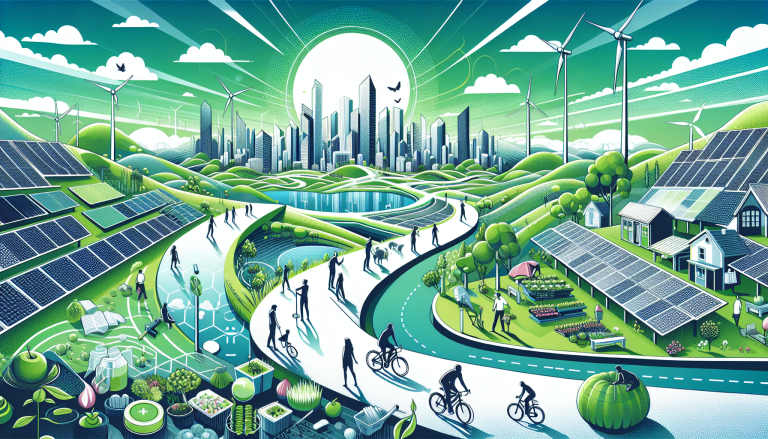Harnessing the Power of Environmental Science: Paving the Way for a Sustainable Future
As the world grapples with the pressing challenges of climate change and resource depletion, the field of environmental science has emerged as a beacon of hope, offering innovative solutions and a roadmap towards a more sustainable future. With its interdisciplinary approach, cutting-edge research, and unwavering commitment to safeguarding our planet, environmental science is poised to transform the way we interact with the natural world.

Driving the Renewable Energy Revolution
One of the most significant contributions of environmental science has been its pivotal role in the development of renewable energy technologies. From the advancements in solar photovoltaic cells to the optimization of wind turbine design, environmental scientists have been at the forefront of this clean energy revolution. By harnessing the power of the sun, wind, and other renewable resources, they have developed cost-effective and efficient solutions that are rapidly replacing fossil fuels and reducing our carbon footprint.
“The renewable energy transition is not just about technology – it’s about a fundamental shift in our relationship with the environment,” says Dr. Emily Greenfield, a leading expert in renewable energy systems. “Environmental science has provided the scientific foundation and the innovative mindset needed to transform our energy landscape and create a more sustainable future.”
One shining example of this transformation is the Ivanpah Solar Electric Generating System in the Mojave Desert, California. This massive solar thermal power plant, built with the guidance of environmental scientists, uses thousands of mirrors to focus sunlight onto boilers, generating steam to drive turbines and produce clean, renewable electricity. The project has not only reduced greenhouse gas emissions but has also created new jobs and economic opportunities in the region.
Tackling the Climate Change Challenge
As the world grapples with the unprecedented impacts of climate change, environmental science has emerged as a vital tool in understanding and addressing this global crisis. Through rigorous research, environmental scientists have provided crucial insights into the complex dynamics of the Earth’s climate system, allowing policymakers and global leaders to make informed decisions and implement effective mitigation strategies.
“Climate change is one of the greatest challenges facing humanity, and environmental science is essential to unraveling its mysteries and developing solutions,” says Dr. Samantha Wilkins, a climate scientist at a leading research institute. “By combining field observations, advanced modeling, and interdisciplinary collaboration, we can better understand the drivers of climate change and devise strategies to adapt and build resilience.”
One remarkable example of environmental science’s contribution to climate change mitigation is the development of carbon capture and storage (CCS) technology. By capturing carbon dioxide emissions from industrial sources and storing them underground, CCS has the potential to significantly reduce greenhouse gas emissions and mitigate the impact of climate change. Environmental scientists have been instrumental in advancing the scientific understanding of CCS, ensuring its safety, and optimizing its deployment.
Promoting Sustainable Development
At the heart of environmental science lies a deep commitment to sustainable development – the concept of meeting the needs of the present without compromising the ability of future generations to meet their own needs. Environmental scientists have been at the forefront of developing and implementing sustainable practices across a wide range of sectors, from agriculture and urban planning to resource management and waste reduction.
“Sustainable development is not just a lofty goal – it’s a necessity for the long-term survival and prosperity of our planet,” says Dr. Olivia Ramirez, an expert in sustainable urban design. “Environmental science provides the scientific foundation and the practical solutions needed to create a more harmonious relationship between human activities and the natural environment.”
One inspiring example of environmental science’s contribution to sustainable development is the work being done in urban agriculture. By leveraging scientific principles and innovative technologies, environmental scientists have helped to establish thriving urban farms and vertical gardens, providing fresh, locally-grown produce to city residents while reducing the environmental impact of traditional agriculture.
Preserving Biodiversity and Ecosystems
The natural world is a complex tapestry of interconnected ecosystems, each playing a vital role in the overall health and resilience of our planet. Environmental science has been instrumental in deepening our understanding of these delicate systems and developing strategies to protect and restore them.
“Biodiversity is the foundation of a healthy, functioning planet, and environmental science is essential to conserving and managing these precious natural resources,” says Dr. Liam Donovan, an expert in ecosystem ecology. “By combining field research, ecological modeling, and collaborative efforts, we can develop effective conservation strategies and ensure the long-term viability of our planet’s diverse flora and fauna.”
One remarkable success story in the realm of conservation is the recovery of the mountain gorilla population in Rwanda. Through a concerted effort involving environmental scientists, policymakers, and local communities, the number of mountain gorillas has steadily increased in recent years, showcasing the power of science-driven conservation initiatives.
As we look to the future, the transformative potential of environmental science is clear. By harnessing the power of renewable energy, addressing the challenges of climate change, promoting sustainable development, and preserving the world’s precious ecosystems, environmental science is paving the way for a more sustainable and resilient future. Through continued innovation, collaboration, and a steadfast commitment to the planet, environmental science will play a crucial role in shaping a better tomorrow for all.


